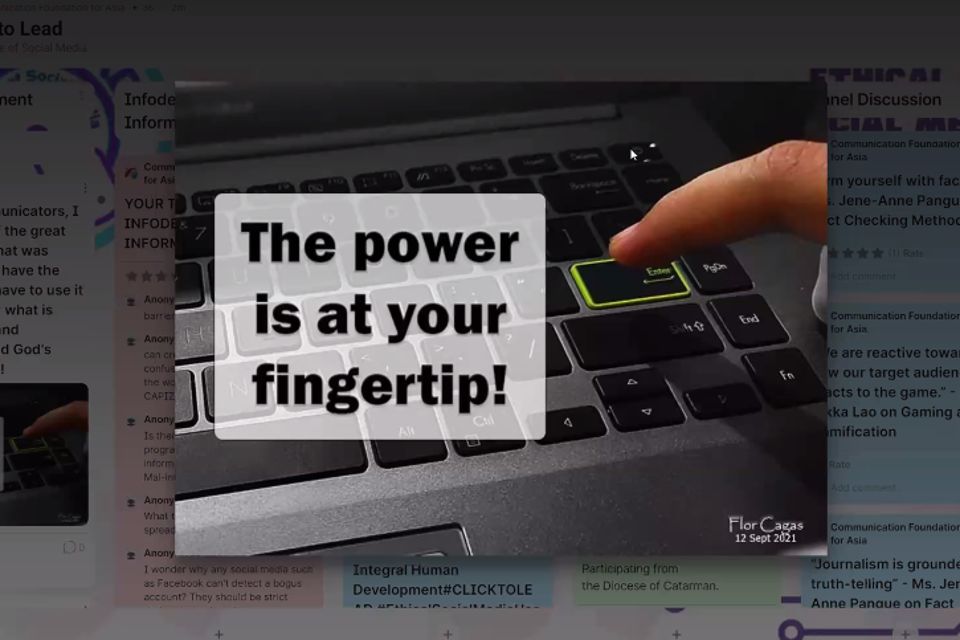
Digital Transformation – Ultimate Goal of Social Media Users
On the businessman’s point of view, digital transformation is defined as the process of using digital technologies to create new — or modify existing — business processes, culture, and customer experiences to meet changing business and market requirements. This reimagining of business in the digital age is digital transformation.
Like all the other kinds of medium, the social media is being utilized to inform, to express feelings, to imagine, to influence, meet social expectations and for entertainment.
Due to the emergence of different digital platforms, everyone who uses social media become what we call as netizens, digital citizens who now possess the power to publish, post, send any message at the tip of one’s fingertips in just one click.
During the latest convergence of social communication ministry workers of the Catholic Church, social media experts and analysts presented the current status and landscape of how people use the social media.
More than a hundred participants logged on to a 2-day webinar entitled, Click to Lead: Ethical Use of Social Media sponsored and organized by Signis Philippines, Communication Foundation for Asia (CFA) and the Catholic Bishops’ Episcopal Commission on Social Communications (CBCP-ECSC).
At the opening program, CFA President Fr. Filoteo C. Pelingon, MSC emphasized the additional role of each social communicator that is to defend human dignity and to celebrate beauty and truth, teach what is human and as brothers and sisters in the world, treat one another with justice, compassion, love and care.
Fr. Pelingon defined what is to be ethical: to know what is right and what is wrong and know the message of our Lord, to spread the Gospel of Love, because “Love without Justice is meaningless.”
He added that in social communications, there are 3 “I’s”: Instruction; Insist (persuade people to truth, what is just and what is good); and Involve people to do the right thing. “And that is mission,” he quipped.
A professor of the University of the Philippines Ms. Yvonne Chua emphasized that in today’s pandemic, people turn to social media to communicate resulting to infodemic and information disorder.
According to her, there is too much information disorder, in 3 different forms:
- Misinformation – sharing wrong information knowingly or unknowingly without intent to harm
- Disinformation – sharing wrong info knowingly with intent to cause harm, deceive or profit
- Malinformation – sharing of genuine information with intent to cause harm. From private to public sphere.
The only thing that could protect oneself from a deluge of defective or fake information is to verify when people are divided on the issue of government regulation to have a law passed against the intentional spreading of incorrect information versus freedom of speech and self-expression.
Re-echoing Pope Paul VI’s Decree on Social Communications (Inter Mirifica), CFA Executive Director, Ms. Pie Mabanta-Fenomeno said that social communication should be geared towards integral human development.
“There is a need for pastoral directive; the church needs to monitor the use of social communications and media and ensure the spiritual well being of people,” she added.
That is why, social communicators (SoCComs) have the responsibility to be knowledgeable about the media as stated in the Moscow Declaration in Media and Information Literacy in 2012: Media and Information Literacy is a “combination of knowledge, attitudes, skills and practices required to access, analyzed, evaluate, use, produce and communicate information and knowledge in creative, legal and ethical ways that respect human rights.”
SoCComs are challenged not to be contented in just liking, sharing or posting, “this is not activism,” she added, “social media conversations should inspire ACTION.”
If there is ecological transformation, there is also digital transformation that is urgently needed especially in the Philippines that has been tagged as the world’s social media capital.
According to Ms. Fenomeno, “the ethical use of social media is not just being polite and nice to each other but looking after our brethren, defending the marginalized, empowering the voiceless; to be ethical is to have a just, peaceful, democratic public space where men and women are empowered to make their lives and build a community of faith, hope and love.”
As a reaction, one of DXGN Spirit FM’s anchor, Cesar Cuyugan says, “There are many ways to use social media for God’s work. One way is by making Podcasts which is similar to doing a radio program but shorter duration to keep the attention of the listener. This is a challenge for our SocComs and Anchors. We will have to maximize the ways of using social media to share the Good News to all.”
On the other hand, DXGN Spirit FM’s traffic and database in-charge, Mary Jane Alba says, “What we do on social media is not just for us but for everyone and for the glory of the Lord. It doesn’t matter how many LIKe’s we receive but more importantly how we inspire and touch the lives of so many people and how we make them feel that the presence of God is always there.”


No Comments